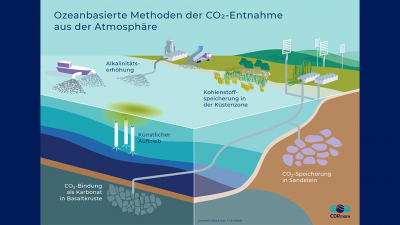- Home
- Discover
- Archive News
- News 2022
- CDRmare meeting
CDRmare researchers discuss ocean-based methods for removing carbon dioxide from the atmosphere
– Joint press release of the Leibniz Institute for Baltic Sea Research Warnemünde and the GEOMAR Helmholtz Centre for Ocean Research Kiel –
Since August 2021, about 200 scientists from a total of 22 research institutions, authorities and companies have been working within the framework of the research mission CDRmare, which is coordinated at GEOMAR Helmholtz Centre for Ocean Research Kiel and the Leibniz Institute for Baltic Sea Research Warnemünde (IOW) and funded with 26 million euros by the Federal Ministry of Education and Research.
This week, the researchers are meeting in Lüneburg for the first general CDRmare conference for intensive professional exchange and to strengthen their network. Various methods for marine CO2 removal and storage will be discussed with regard to their potential, risks and possible impacts on the marine environment and the Earth system. Specifically, this involves increasing the alkalinity of seawater – for example by introducing rock flour – to enhance CO2 exchange between the atmosphere and the ocean, artificially generated upwelling of nutrient-rich deep water to increase the uptake of atmospheric CO2 in algal biomass, improving the carbon storage potential of vegetation-rich coastal ecosystems and CO2 storage in the seabed. The spectrum of research approaches ranges from laboratory studies to mesocosm studies in natural ecosystems of the North Sea and the Baltic Sea, studies in tropical mangrove forests to regional and global modelling. The political, economic and social framework conditions of possible measures are also scientifically investigated.
All research activities are carried out in close dialogue with the relevant societal stakeholders. Ultimately, the results of the CDRmare research mission are intended to provide the scientifically validated basis for ground-breaking political and societal decisions.
Online press conference on 21 March 2022
The Lüneburg CDRmare conference is not open to the public as it is used for internal project coordination and planning. However, media representatives will have the opportunity to participate in an online press conference in German language on 21 March from 12:30 to 14:00. More information about the online press conference and registration details can be found in the German version of this press release.
In the research mission “Marine carbon sinks in decarbonization pathways”– in short: CDRmare – of the German Marine Research Alliance (DAM), about 200 scientists in six collaborative research consortia are investigating, how and to what extent the ocean can play a sustainable role in the removal and storage of carbon dioxide from the atmosphere. The long-term goal is to develop a roadmap for the active use of marine carbon sinks in order to contribute to the mitigation of the impacts of anthropogenic climate change and to help achieve the Paris climate goals. CDRmare (CDR = Carbon Dioxide Removal) is coordinated at the GEOMAR Helmholtz Centre for Ocean Research Kiel and the Leibniz Institute for Baltic Sea Research Warnemünde. Germany's Federal Ministry of Education and Research is funding the research mission with 26 million euros over an initial phase of three years (1.8.2021 - 31.7.2024).
Further information:
www.cdrmare.de/en
The German Marine Research Alliance and its 22 member institutions develop solutions-oriented knowledge and potential courses of action for the sustainable use of coasts, seas and oceans.



